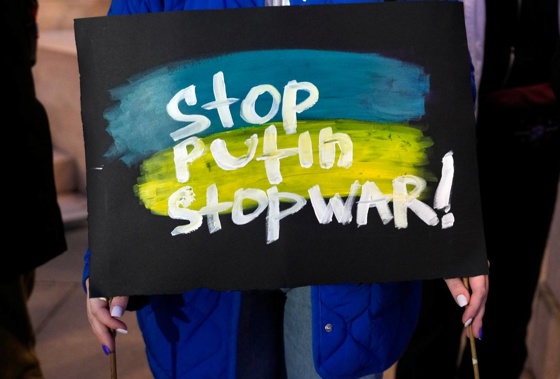
Large numbers of Russians rushed to book one-way tickets out of the country while they still could yesterday after Russian President Vladimir Putin announced a partial mobilisation of military reservists for the war in Ukraine.
Flights filled up quickly and the prices of tickets for remaining connections sky-rocketed, apparently driven by fears that Russia's borders could soon close or of a broader call-up that might send many Russian men of fighting age to the war's front lines.
Tickets for Moscow-Belgrade flights operated by Air Serbia, the only European carrier besides Turkish Airlines to maintain flights to Russia despite a European Union flight embargo, sold out for the next several days. The price for flights from Moscow to Istanbul or Dubai increased within minutes before jumping again, reaching 9200 euros ($15,400) for a one-way economy class fare.
Putin's decree stipulates that the amount of people called to active duty will be determined by the Defense Ministry. Defense Minister Sergei Shoigu said in a televised interview that 300,000 reservists with relevant combat and service experience initially would be mobilised.
/cloudfront-ap-southeast-2.images.arcpublishing.com/nzme/IIS7PCJPIRTOHMARTLP5LOK7BY.jpg)
Russian President Vladimir Putin and Defense Minister Sergei Shoigu at the opening of the Army 2022 International Military and Technical Forum. Photo / Sputnik via AP, File
Russia has seen a marked exodus of citizens since Putin ordered his troops to invade Ukraine almost seven months ago. During the early morning address to the nation in which the president announced the partial mobilisation of reservists, he also issued a veiled nuclear threat to Russia's enemies in the West.
Reports of panic spreading among Russians soon flooded social networks. Anti-war groups said the limited air tickets out of Russia reached enormous prices due to high demand and swiftly became unavailable.
Some postings alleged people already had been turned back from Russia's land border with Georgia and that the website of the state Russian railway company collapsed because too many people were checking for ways out of the country.
/cloudfront-ap-southeast-2.images.arcpublishing.com/nzme/SMHA77SLT2NHS47UTDNWW2KGBQ.jpg)
- 'Extraordinary escalation': Ardern hits out at Putin after meeting with Ukrainian PM
- Putin fails to turn up to own war speech
A woman holds a banner in Belgrade, Serbia, at a protest against the mobilisation announced by Russian President Vladimir Putin. Photo / Darko Vojinovic, AP
Social networks in Russian also surged with advice on how to avoid the mobilisation or leave the country.
Russian officials sought to calm the public, stressing that the call-up would affect a limited number of people fitting certain criteria. However, conflicting statements and a lack of details helped fuel the panic.
The head of the Duma defence committee, Andrei Kartapolov, said there would be no additional restrictions on reservists leaving Russia based on this mobilisation. But he also advised individuals who could be eligible for the call-up against "travelling to resorts in Turkey".
"Spend your vacation at the resorts of Crimea or [Russia's southern] Krasnodar region," Russian media quoted Kartapolov as saying.
Despite Russia's harsh laws against criticizing the military and the war, there were protests across the country. More than 800 Russians were arrested in anti-war protests in 37 Russian cities, including Moscow and St. Petersburg, according to the independent Russian human rights group OVD-Info.
/cloudfront-ap-southeast-2.images.arcpublishing.com/nzme/46UEX24DGG4KE4Q4CXFQU5IN4I.jpg)
Police detain demonstrators during a protest against mobilisation in Yekaterinburg, Russia. Photo / AP
An Associated Press crew in Moscow witnessed at least a dozen arrests in the first 15 minutes of a protest in the capital.
Asked whether protesting would help, one Muscovite who declined to give their name said: "It won't help, but it's my civic duty to express my stance. No to war!"
"Thousands of Russian men — our fathers, brothers and husbands — will be thrown into the meat grinder of the war. What will they be dying for? What will mothers and children be crying for?" the Vesna opposition movement said, calling for protests.
As protest calls circulated online, the Moscow prosecutor's office warned that organizing or participating in such actions could lead to up to 15 years in prison. Authorities issued similar warnings ahead of other protests recently. Wednesday's were the first nationwide antiwar protests since the war began in late February.
/cloudfront-ap-southeast-2.images.arcpublishing.com/nzme/MZORUBCZL47B5KRNE7UMNR35GU.jpg)
Police detain a demonstrator during a protest against mobilisation in Yekaterinburg, Russia yesterday. Photo / AP
The state communication watchdog Roskomnadzor also warned media that access to their websites would be blocked for transmitting "false information" about the mobilization. It was unclear exactly what that meant.
A group based in Serbia, called Russians, Belarussians, Ukrainians and Serbs Together Against War, tweeted that there were no available flights to Belgrade from Russia until mid-October. Flights to Turkey, Georgia or Armenia also sold out, according to the Belgrade-based group.
"All the Russians who wanted to go to war already went," the group said. "No one else wants to go there!"
Serbia's capital, Belgrade, has become a popular destination for Russians during the war. Up to 50,000 Russians have fled to Serbia and many opened businesses, especially in the IT sector.
/cloudfront-ap-southeast-2.images.arcpublishing.com/nzme/5YF2D5QR2ZZN3PRRJ366GTWW2E.jpg)
Passengers from the Moscow-Belgrade flight, operated by Air Serbia, pass through the airport building in Belgrade, Serbia. Photo / Darko Vojinovic, AP
Russians don't need visas to enter Serbia, which is the only European country that has not joined Western sanctions against Russia for its aggression in Ukraine.
A Wednesday flight from Moscow to Belgrade was packed with young Russian men who said they could not speak to reporters because they feared negative repercussions for the families they left behind.
An elderly Russian woman, who identified herself as Yulia, said she, too, was afraid "my government and police" might see her remarks.
"But I want to say, 'Freedom for Ukraine'. Please, somebody stop Putin," she said. — Dusan Stojanovic, AP
Take your Radio, Podcasts and Music with you









